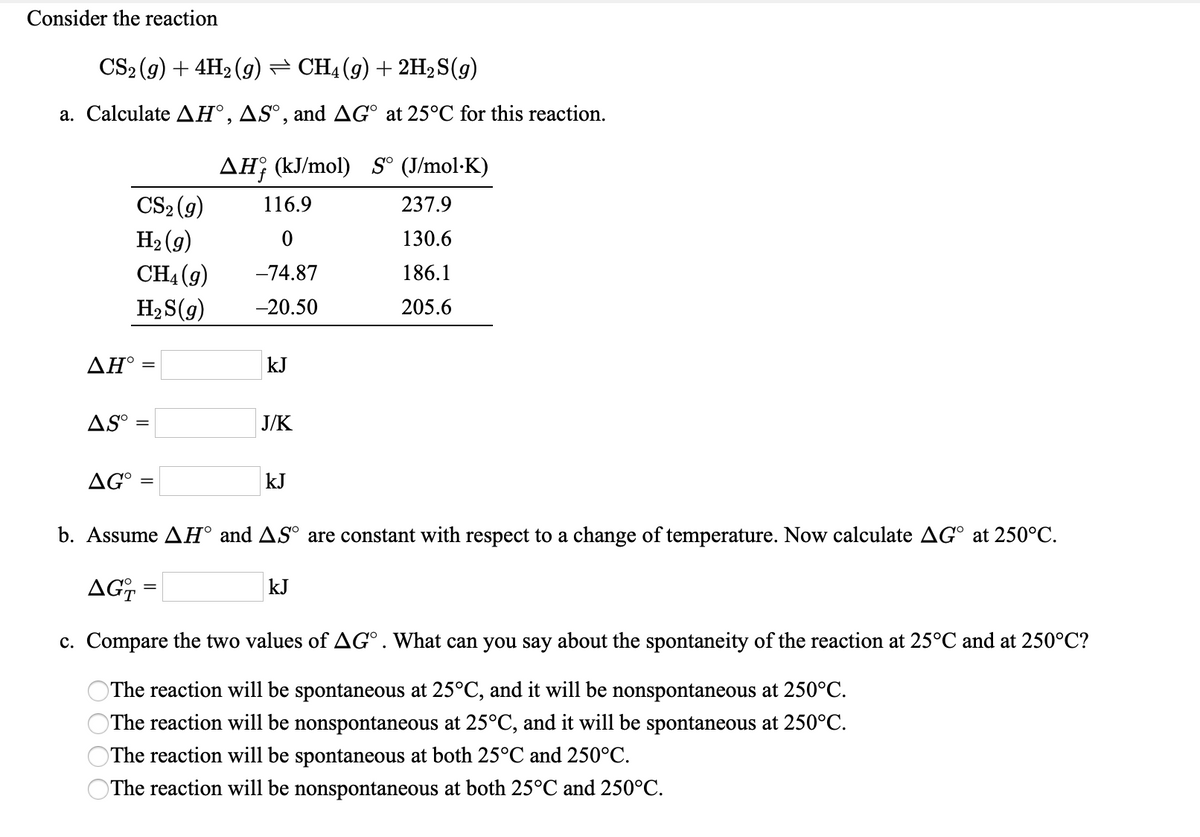Consider the reaction CS2 (g) + 4H2 (g) = CH4 (9) + 2H,S(g) a. Calculate AH°,AS°, and AG° at 25°C for this reaction. AH; (kJ/mol) S° (J/mol·K) CS2 (g) 116.9 237.9 130.6 H2 (9) CH4 (9) -74.87 186.1 H,S(g) -20.50 205.6 ΔΗ. kJ AS° = J/K AG° kJ b. Assume AH° and ASº are constant with respect to a change of temperature. Now calculate AG° at 250°C. AG kJ %3D c. Compare the two values of AG°. What can you say about the spontaneity of the reaction at 25°C and at 250°C? The reaction will be spontaneous at 25°C, and it will be nonspontaneous at 250°C. The reaction will be nonspontaneous at 25°C, and it will be spontaneous at 250°C. The reaction will be spontaneous at both 25°C and 250°C. The reaction will be nonspontaneous at both 25°C and 250°C.
Consider the reaction CS2 (g) + 4H2 (g) = CH4 (9) + 2H,S(g) a. Calculate AH°,AS°, and AG° at 25°C for this reaction. AH; (kJ/mol) S° (J/mol·K) CS2 (g) 116.9 237.9 130.6 H2 (9) CH4 (9) -74.87 186.1 H,S(g) -20.50 205.6 ΔΗ. kJ AS° = J/K AG° kJ b. Assume AH° and ASº are constant with respect to a change of temperature. Now calculate AG° at 250°C. AG kJ %3D c. Compare the two values of AG°. What can you say about the spontaneity of the reaction at 25°C and at 250°C? The reaction will be spontaneous at 25°C, and it will be nonspontaneous at 250°C. The reaction will be nonspontaneous at 25°C, and it will be spontaneous at 250°C. The reaction will be spontaneous at both 25°C and 250°C. The reaction will be nonspontaneous at both 25°C and 250°C.
Chemistry for Engineering Students
4th Edition
ISBN:9781337398909
Author:Lawrence S. Brown, Tom Holme
Publisher:Lawrence S. Brown, Tom Holme
Chapter10: Entropy And The Second Law Of Thermodynamics
Section: Chapter Questions
Problem 10.14PAE: Enthalpy changes often help predict whether or not a process will be spontaneous. What type of...
Related questions
Question

Transcribed Image Text:Consider the reaction
CS2 (g) + 4H2 (g) = CH4(g) + 2H,S(g)
a. Calculate AH°,AS°,and AG° at 25°C for this reaction.
AH; (kJ/mol) S° (J/mol·K)
CS2 (g)
H2 (g)
CH4 (g)
116.9
237.9
130.6
-74.87
186.1
H2 S(g)
-20.50
205.6
ΔΗ'
kJ
AS° =
J/K
AG°
kJ
b. Assume AH° and AS° are constant with respect to a change of temperature. Now calculate AG° at 250°C.
AG
kJ
c. Compare the two values of AG°. What can you say about the spontaneity of the reaction at 25°C and at 250°C?
The reaction will be spontaneous at 25°C, and it will be nonspontaneous at 250°C.
The reaction will be nonspontaneous at 25°C, and it will be spontaneous at 250°C.
The reaction will be spontaneous at both 25°C and 250°C.
The reaction will be nonspontaneous at both 25°C and 250°C.
Expert Solution
This question has been solved!
Explore an expertly crafted, step-by-step solution for a thorough understanding of key concepts.
This is a popular solution!
Trending now
This is a popular solution!
Step by step
Solved in 3 steps with 2 images

Knowledge Booster
Learn more about
Need a deep-dive on the concept behind this application? Look no further. Learn more about this topic, chemistry and related others by exploring similar questions and additional content below.Recommended textbooks for you

Chemistry for Engineering Students
Chemistry
ISBN:
9781337398909
Author:
Lawrence S. Brown, Tom Holme
Publisher:
Cengage Learning

Chemistry & Chemical Reactivity
Chemistry
ISBN:
9781133949640
Author:
John C. Kotz, Paul M. Treichel, John Townsend, David Treichel
Publisher:
Cengage Learning

Chemistry & Chemical Reactivity
Chemistry
ISBN:
9781337399074
Author:
John C. Kotz, Paul M. Treichel, John Townsend, David Treichel
Publisher:
Cengage Learning

Chemistry for Engineering Students
Chemistry
ISBN:
9781337398909
Author:
Lawrence S. Brown, Tom Holme
Publisher:
Cengage Learning

Chemistry & Chemical Reactivity
Chemistry
ISBN:
9781133949640
Author:
John C. Kotz, Paul M. Treichel, John Townsend, David Treichel
Publisher:
Cengage Learning

Chemistry & Chemical Reactivity
Chemistry
ISBN:
9781337399074
Author:
John C. Kotz, Paul M. Treichel, John Townsend, David Treichel
Publisher:
Cengage Learning

Chemistry
Chemistry
ISBN:
9781305957404
Author:
Steven S. Zumdahl, Susan A. Zumdahl, Donald J. DeCoste
Publisher:
Cengage Learning


Chemistry: An Atoms First Approach
Chemistry
ISBN:
9781305079243
Author:
Steven S. Zumdahl, Susan A. Zumdahl
Publisher:
Cengage Learning